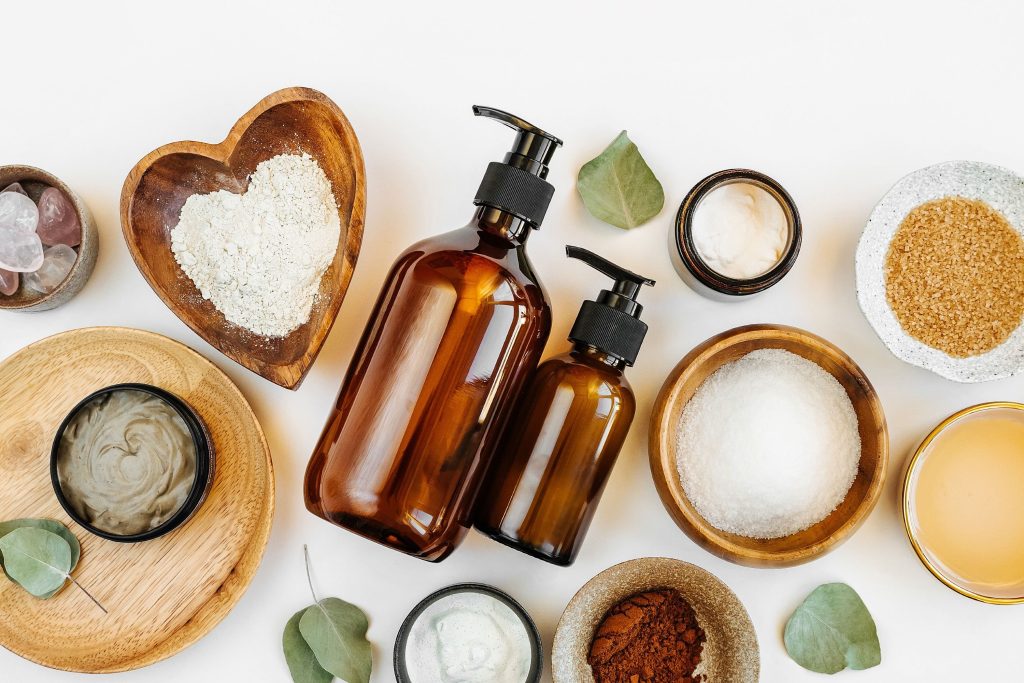People have become more intentional about what they use on their skin. They prefer products without synthetic or toxic ingredients. One trend in the last few years is a shift toward natural and organic cosmetics.
By the end of this article, you’ll be able to distinguish chemical-free beauty products from traditional ones. It’ll also help you determine if the switch to organic and natural cosmetics is worth it. Keep reading to learn more.
Table of Contents
Natural Cosmetics
Cosmetics companies use raw materials from plants, animals, or minerals to create skin products like this natural foundation. Natural skin products can be slightly processed or completely unprocessed. But in general, they should be free from additives and preservatives.
However, the FDA (Food and Drug Administration) is yet to define what ‘natural’ means when it comes to cosmetic labeling. It means that not all cosmetic products labeled ‘natural’ are, in fact, safe for everyone to use.
Natural beauty products may have ingredients such as:
-
Aloe Vera Extract
Aloe vera extract is a common component in natural cosmetics. It has vitamins A and C and anti-inflammatory elements. You can use it to minimize acne, boost skin hydration, and treat burns.
-
Vitamin C
Vitamin C is a popular ingredient in cosmetic products. It triggers collagen production, which minimizes wrinkles and fine lines on the skin. Vitamin C also decreases hyperpigmentation, therefore, evening the skin. Using cosmetics with this vitamin also helps repair skin damage from sun exposure.
-
Hyaluronic Acid
This natural ingredient has recently gained popularity because of its moisturizing capabilities. Hyaluronic acid occurs naturally within our bodies. However, people who lack this compound may have dry skin conditions. They could therefore benefit from supplementing hyaluronic acid levels in their body for moisturized skin.
Knowing these ingredients is crucial as it helps you identify natural cosmetics from chemical-based ones.
Organic Cosmetics
Organic beauty products are created without chemical fertilizers, pesticides, or antibiotics. These cosmetics are free of parabens, sulfates, and silicones. Some examples of ingredients in organic cosmetics include:
- Jojoba oil: It promotes skin hydration and reduces inflammation.
- Sweet orange oil: This ingredient is known for its aromatherapeutic advantages.
- Olive oil, sesame oil, and shea butter: These oils help reduce wrinkles and fine lines.
- Calendula oil: It has anti-inflammatory properties, which helps to treat acne.
Is Switching To Natural Or Organic Cosmetics Worth It?
The answer is yes. Natural and organic cosmetics are worth the switch for numerous reasons, such as:
-
They’re Environmental Friendly
As mentioned earlier, some natural cosmetics are slightly processed, and others are unprocessed. So, with minimal or no refining required, the environment is safe from contamination. Moreover, 95% of ingredients used in organic cosmetics must be cultivated without harmful compounds. You can help reduce waste and pollution by switching to wholesome beauty products.
-
They’re Cruelty-Free
Unlike synthetic cosmetics, natural and organic products aren’t tested on animals to verify quality and safety. Ideally, they don’t contain chemicals, thus, promoting adherence to ethical standards. Using these products also shows your support for animal wellbeing. However, it’s essential to do your due diligence to ascertain whether these cosmetics are cruelty-free products.
-
They’re Safer
The ingredients in organic and natural cosmetics are generally safe. The absence of chemicals in these products means they may have no or fewer adverse effects. This is unlike synthetic cosmetics, which contain may chemicals used during manufacturing and preservation. While not all refined cosmetics are the same, some may contain toxic ingredients at high levels, which are harmful to the body.
For example, in a day, you may use a body wash, cleanser, toner, moisturizer, sunscreen, deodorant, and makeup. If each of these products contains harmful chemicals, the toxins can build up in your body and manifest as skin irritations and other severe health conditions.
Imidazolidinyl Urea and Diazolidinyl Urea are common preservatives in regular cosmetics. These two ingredients produce a chemical known as formaldehyde which may have harmful effects. The American Academy of Dermatology has found these two preservatives to be a possible cause of contact dermatitis. Therefore, organic or natural cosmetics are the safest way to care for your skin.
-
They Promote Better Skin Health Outcomes
Natural and organic beauty products have little to no chemicals, making them less likely to produce adverse effects. You can enjoy better efficacy when you include them in your beauty and skincare routine. With time, you’ll start seeing results, such as a better appearance and boosted confidence.
Overall, natural and organic cosmetics give you value for money while caring for your skin and your surroundings.
Winding Up
Switching to organic and natural products is worth it. These cosmetics are safe and promote better skin health outcomes. Thus, you don’t have to worry about them damaging your skin. Additionally, pure cosmetics are environmentally friendly, cruelty-free, and promote sustainability. However, it’s worth noting that not all organic products are hypoallergenic. Therefore, consider conducting an allergy skin test to verify which pure cosmetics are compatible with your skin.
